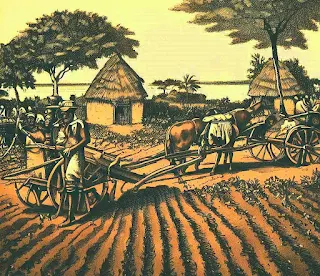Portuguese Penal Codes in Mozambique
The Darkest Side of Portuguese Colonial Labor in Mozambique and the Native Labor Code of 1878.
In the historical context of labor practices in Mozambique during the Portuguese colonial period, this southeastern African territory, twice the size of California, became significant to Portugal following the explorer Vasco da Gama's arrival in 1487.
Initially serving as a center for controlling sea trade routes to the East Indies, Mozambique later evolved into a full-fledged Portuguese colonial possession. In 1822, it was officially designated as an overseas province, a status it retained, except for a brief period from 1930 to 1951 when it was categorized as a colony. Ultimately, Portugal did not relinquish its hold on Mozambique until 1975.
The labor landscape in Mozambique was significantly influenced by the Mozambique Company, which received a charter from the Portuguese government in 1891. This charter granted the company sovereign rights in present-day Manica and Sofala provinces.
In return, the company was entrusted with various responsibilities, including the construction of railroads, roads, ports, the settlement of Portuguese families, the establishment of schools and hospitals, and the general development of the region.
The Mozambique Company, despite its official responsibilities outlined in the charter, prioritized its economic gains over fulfilling its obligations. Instead of carrying out development tasks mandated by the charter, such as building schools hospitals, and settling Portuguese families, the company concentrated on constructing infrastructure, like railroads and ports, which directly benefited its commercial operations.
This contributed to the darkest side of colonial labor in Mozambique because it demonstrated the company's exploitation of the colony's resources and labor force for its own profit. By neglecting its duties to improve living conditions and the local population's well-being, the company perpetuated a system of economic exploitation.
This focus on profit-driven infrastructure development, rather than genuine socio-economic development, created a harsh and oppressive labor environment for the African population in Mozambique, furthering their exploitation and suffering under colonial rule.
Forced Labor and Colonial Rule in Mozambique
One of the most detrimental and enduring consequences of the Mozambique Company's activities was its labor policy. Historically, the Portuguese had sought a reliable supply of cheap labor, initially through slavery and later through forced labor with minimal wages.
The Native Labor Code of 1878, enacted shortly after the formal abolition of slavery, was intended to improve labor conditions by allowing Africans to work for Europeans. Only individuals categorized as vagrants under the Portuguese penal code could be compelled to work. Unfortunately, the interpretation of the vagrancy clause was stretched to include all Africans engaged in their traditional work instead of making themselves available to European employers.
Following the financial crisis of the 1890s, the Portuguese government recognized the need for a comprehensive revision of its economic policies, particularly regarding the colonies. In 1898, a committee was formed to study the labor situation in Portuguese Africa, concluding that forced labor was essential for economic and cultural development in African territories. The principles laid out by this committee were subsequently adopted in a decree that remained largely unchanged for nearly three decades.
From Slavery to Forced Labor: The Evolution of African Labor in Mozambique
Under the Mozambique Company's authority, labor recruitment for work outside its territory was prohibited, effectively reserving the region's manpower for the company's exclusive use. Male Africans were compelled to work on local sugar plantations and public works projects.
Attempting to leave resulted in a punishing 20 months of forced labor without pay. Female Africans were tasked with growing cash crops such as cotton for sale to the company, leading to a shortage of food crops to sustain the local population. Moreover, the company imposed exorbitant hut taxes, forcing African inhabitants into extended periods of labor just to meet their tax obligations.
Conditions were even harsher in territories managed by the Nyassa Company, particularly in the northernmost part of Mozambique. Lacking capital for development, the Nyassa Company resorted to exporting labor from its territory to other parts of Africa and imposing heavy taxes on those who remained. Local officials paid meager salaries were allowed to retain a percentage of the taxes they collected, a policy that fostered widespread abuses.
Colonial Mozambique's labor practices included forced labor, taxation, and depopulation.
Families were torn apart as males were exported for labor elsewhere, leaving behind a population predominantly composed of women and children. In this dire situation, rape became distressingly commonplace, and even murder was tolerated with alarming indifference. Food was used as a means of coercion.
Although Africans resisted when possible, more often, they fled to neighboring colonies such as British Nyasaland and German East Africa. In less than three decades, over 100,000 individuals left for Nyasaland alone, contributing to a massive depopulation of the region.
The labor policies enforced during Mozambique's colonial history, particularly under the Mozambique and Nyassa Companies, had profoundly negative effects on the local population, with enduring consequences for the people and the region.
These policies included forced labor, oppressive taxation, and a general disregard for the welfare and rights of the African labor force, ultimately contributing to a long-lasting legacy of suffering and depopulation in Mozambique.






